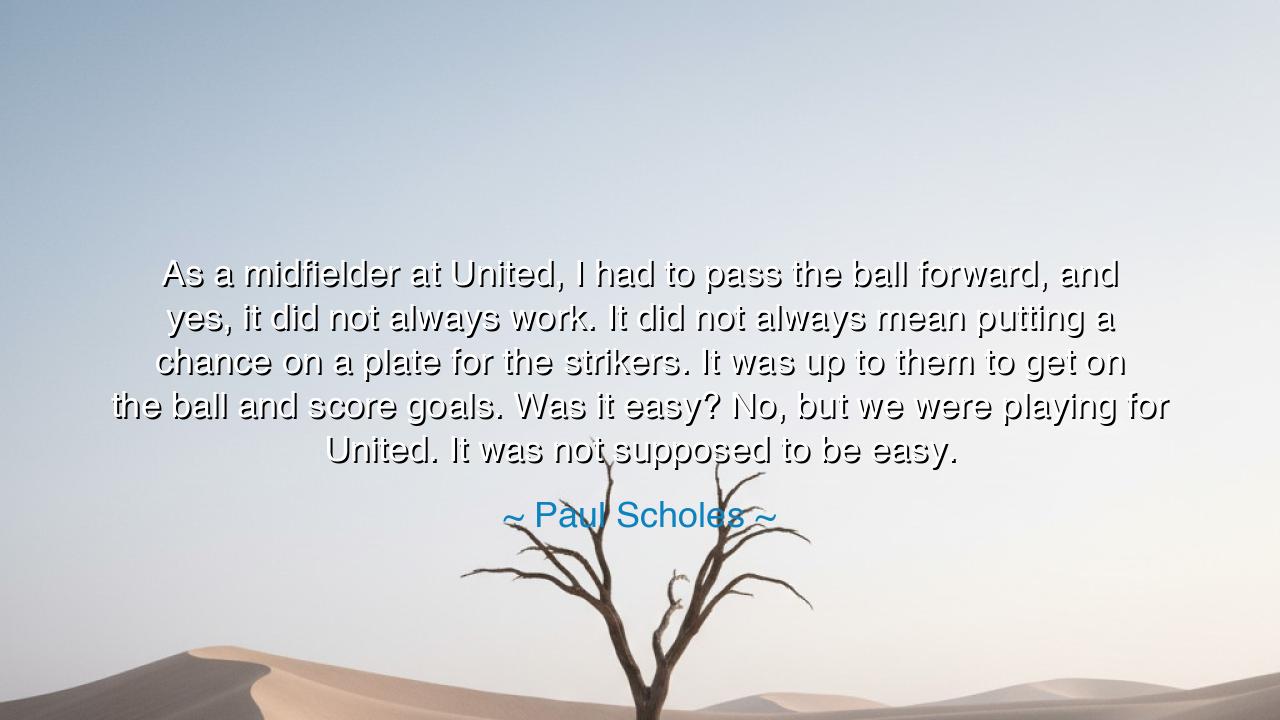
As a midfielder at United, I had to pass the ball forward, and
As a midfielder at United, I had to pass the ball forward, and yes, it did not always work. It did not always mean putting a chance on a plate for the strikers. It was up to them to get on the ball and score goals. Was it easy? No, but we were playing for United. It was not supposed to be easy.






In the grand battle of life, where warriors of all kinds face challenges that test their strength and resolve, there is a wisdom in understanding that success is not always about instant triumph, but about the courage to make decisions, to play your part, and to trust others with the outcome. Paul Scholes, the legendary midfielder for Manchester United, speaks of this truth with the clarity of a seasoned warrior when he says: "As a midfielder at United, I had to pass the ball forward, and yes, it did not always work. It did not always mean putting a chance on a plate for the strikers. It was up to them to get on the ball and score goals. Was it easy? No, but we were playing for United. It was not supposed to be easy." These words, though spoken from the realm of football, contain wisdom that transcends the field and speaks to the core of human effort.
To be a midfielder in the world of football is to be both strategist and servant. The midfielder’s job is not to score the goals themselves, but to serve the team, to position the ball, to offer the chance for victory. In this, there is a great lesson. In life, as in football, we are often called upon not to claim the victory for ourselves, but to help others achieve their own. Scholes speaks of passing the ball forward, of pushing the opportunity to others, of setting the stage for greatness, knowing that success does not always come immediately. Like the midfielder, we must trust in the strikers—the forces of destiny, the people around us—to take the ball and make something of it. It is not our task to control every moment, but to create opportunities for others to shine.
This idea is deeply rooted in the ancient wisdom of the great leaders and warriors. Alexander the Great, though renowned for his military prowess, knew that victory was not solely his to claim. He was a master of strategy, of creating the right conditions for his generals and soldiers to act. He would lead them into battle, but it was up to them to execute his vision. The general may pass the orders, but the soldiers are the ones who must carry them out, just as the midfielder creates the opportunity, but the striker must score the goal. Success in life and battle, as in football, is often a shared responsibility, with each person playing their part and trusting others to do the same.
In Scholes’ words, there is also an acceptance of failure, of imperfection. He admits that his passes did not always succeed, that his work did not always result in immediate reward. This is the truth of all efforts. Not every decision will lead to success; not every plan will yield results. Yet, it is in the persistence, in the continued effort, that we find our path forward. In the ancient world, there were no guarantees of success. Perseverance was valued above all—whether in the labors of the Greek philosophers, whose wisdom sometimes took years to be recognized, or in the hearts of the Roman gladiators, who fought in the arena with no promise of victory, only the certainty that they would face another battle the next day.
Consider the story of Leonidas and his Spartan warriors at the Battle of Thermopylae. Though they faced overwhelming odds, they did not fight for personal glory; they fought to fulfill their duty, to give everything for their people. Leonidas, though a leader, did not bear the brunt of the fight alone. He trusted his warriors to execute his commands, just as Scholes trusted his strikers to do their part. Though the battle was lost, their effort was immortalized, not because it was easy, but because they gave everything, knowing that the task was difficult, knowing that not every action would yield immediate success.
Scholes’ reflection on his role at Manchester United also speaks to the greater principle of teamwork. In life, we often find ourselves in positions where we are called to play our part without immediate recognition, without direct rewards. We may pass the ball forward, setting up others for success, but we may never know the full impact of our contribution. Yet, like Scholes, we must continue to trust that the strikers—the opportunities we create, the people we help—will take the chance and make something of it. The greatest rewards in life often come not from seeking personal victory, but from the strength and honor of playing our part in the larger story.
The lesson for us, then, is one of humility and service, paired with the courage to accept that success is often a long and difficult road. It is not always easy to pass the ball, to offer others the chance to shine, knowing that failure may come as well as victory. Yet it is through this sacrifice, this willingness to contribute to something greater than ourselves, that we find true greatness. Just as Scholes gave his best for the team, we must give our best in every situation, trusting that the outcome will come not from our individual efforts, but from the collective work of all involved. And in this, we will find the honor and satisfaction that lies beyond the final score—the joy of knowing that we played our part in something much larger than ourselves.






AAdministratorAdministrator
Welcome, honored guests. Please leave a comment, we will respond soon